|
|
|
Sort Order |
|
|
|
Items / Page
|
|
|
|
|
|
|
| Srl | Item |
| 1 |
ID:
144020
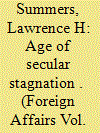

|
|
|
|
|
| Summary/Abstract |
Most observers expected the unusually deep recession to be followed by an unusually rapid recovery, with output and employment returning to trend levels relatively quickly. Yet even with the U.S. Federal Reserve [3]’s aggressive monetary policies, the recovery (both in the United States and around the globe) has fallen significantly short of predictions and has been far weaker than its predecessors [4]. Had the American economy performed as the Congressional Budget Office fore¬cast in August 2009—after the stimulus had been passed and the recovery had started—U.S. GDP today would be about $1.3 trillion higher than it is.
|
|
|
|
|
|
|
|
|
|
|
|
|
|
|
|
| 2 |
ID:
144021
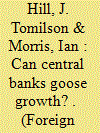

|
|
|
|
|
| Summary/Abstract |
In the years since the global financial crisis of 2008 engulfed the world and the United States fell into the Great Recession, the panic has subsided and Western economies have recovered to varying degrees. But the downturn’s effects have proved profound and lasting, and serious risks [1] persist for the global economy. The recovery has been slow, inflation levels remain below the targets set by central banks, and total debt levels are much higher [2] than before the crisis began.
|
|
|
|
|
|
|
|
|
|
|
|
|
|
|
|
| 3 |
ID:
144030
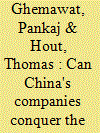

|
|
|
|
|
| Summary/Abstract |
Despite China’s recent economic struggles [2], many economists and analysts argue that the country remains on course to overtake the United States and become the world’s leading economic power someday soon. Indeed, this has become a mainstream view [3]—if not quite a consensus belief—on both sides of the Pacific. But proponents of this position often neglect to take into account an important truth: economic power is closely related to business power, an area in which China still lags far behind the United States.
|
|
|
|
|
|
|
|
|
|
|
|
|
|
|
|
| 4 |
ID:
144022
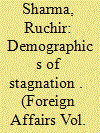

|
|
|
|
|
| Summary/Abstract |
In every single region of the world, economic growth has failed to return to the rate it averaged before the Great Recession [1]. Economists have come up with a variety of theories for why this recovery has been the weakest in postwar history, including high indebtedness, growing income inequality [2], and excess caution induced by the original debt crisis. Although each explanation has some merit, experts have largely overlooked what may be the most important factor: the global slowdown in the growth of the labor force
|
|
|
|
|
|
|
|
|
|
|
|
|
|
|
|
| 5 |
ID:
144024


|
|
|
|
|
| Summary/Abstract |
As China asserts itself in its nearby seas [1] and Russia wages war in Syria [2] and Ukraine, it is easy to assume that Eurasia’s two great land powers are showing signs of newfound strength. But the opposite is true: increasingly, China and Russia flex their muscles not because they are powerful but because they are weak. Unlike Nazi Germany, whose power at home in the 1930s fueled its military aggression abroad, today’s revisionist powers are experiencing the reverse phenomenon. In China and Russia, it is domestic insecurity that is breeding belligerence. This marks a historical turning point: for the first time since the Berlin Wall fell [3], the United States finds itself in a competition among great powers.
|
|
|
|
|
|
|
|
|
|
|
|
|
|
|
|
| 6 |
ID:
144028


|
|
|
|
|
| Summary/Abstract |
The modern Middle East [1] has rarely been tranquil, but it has never been this bad. Full-blown civil wars rage in Iraq [2], Libya, Syria, and Yemen. Nascent conflicts simmer in Egypt, South Sudan, and Turkey. Various forms of spillover from these civil wars threaten the stability of Algeria, Jordan, Lebanon, Saudi Arabia, and Tunisia. Tensions between Iran and Saudi Arabia [3] have risen to new heights, raising the specter of a regionwide religious war. Israel and the Palestinians have experienced a resurgence of low-level violence. Kuwait, Morocco, Oman, Qatar, and the United Arab Emirates have weathered the storm so far, but even they are terrified of what is going on around them. Not since the Mongol invasions of the thirteenth century has the Middle East seen so much chaos.
|
|
|
|
|
|
|
|
|
|
|
|
|
|
|
|
| 7 |
ID:
144027
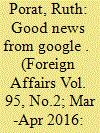

|
|
|
|
|
| Summary/Abstract |
Ruth Porat has taken an unusual path to the tech world. Before becoming the chief financial officer at Google in May 2015 (and then at Alphabet, Google’s new parent company, a few months later), she held the same post at Morgan Stanley, where among other roles she worked closely with the U.S. government to sort out the troubles at the insurance corporation AIG and the mortgage-financing agencies Fannie Mae and Freddie Mac during the 2008 financial crisis. On the shortlist to become deputy treasury secretary in 2013 (before she withdrew [1] her name), Porat, who Politico [2] once referred to as “the most powerful woman on Wall Street,” is now one of the most powerful women in Silicon Valley as well. Some six months into the new job, she met with Foreign Affairs’ managing editor, Jonathan Tepperman, in New York to discuss her move and the global economy.
|
|
|
|
|
|
|
|
|
|
|
|
|
|
|
|
| 8 |
ID:
144025


|
|
|
|
|
| Summary/Abstract |
Almost seven years after the Great Recession officially ended, the U.S. economy continues to grow at a sluggish rate [1]. Real wages are stagnant. The real median wage earned by men in the United States is lower today than it was in 1969. Median household income, adjusted for inflation, is lower now [2] than it was in 1999 and has barely risen in the past several years despite the formal end of the recession in 2009. Meanwhile, the U.S. Federal Reserve Board and the Congressional Budget Office have taken more seriously the idea that U.S. productivity, one of the most important sources of economic growth, may stay low. And such problems are hardly unique to the United States. Indeed, productivity growth has been slow in most of the developed world for some time.
|
|
|
|
|
|
|
|
|
|
|
|
|
|
|
|
| 9 |
ID:
144029


|
|
|
|
|
| Summary/Abstract |
The downing of a Russian passenger plane over Egypt’s Sinai Peninsula last October, for which the Islamic State [1] (also known as ISIS) claimed responsibility, may ultimately prove more consequential than the horrific attacks in Paris [2] and San Bernardino, California, that followed. Western security officials had long worried that their countries’ own citizens would conduct attacks after returning home from Iraq or Syria or strike out as “lone wolf” terrorists. But the Russian plane crash, which killed 224 people, was caused by a different beast: neither lone wolves [3] nor ISIS itself but an ISIS affiliate that had pledged its loyalty to Abu Bakr al-Baghdadi [4], ISIS’ self-declared caliph. ISIS calls these groupswilayat, Arabic for “provinces.” (The term is borrowed from the seventh century, when the armies of Islam burst out of the Arabian Peninsula and established regional governors who ruled in the name of the caliph; ISIS also uses wilayat to refer to administrative divisions within Iraq and Syria.) If, as recent events suggest, ISIS far-flung provinces have begun closely aligning their actions with those of the group’s core leadership in Iraq and Syria, then ISIS geographic scope has expanded vastly.
|
|
|
|
|
|
|
|
|
|
|
|
|
|
|
|
| 10 |
ID:
144033
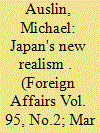

|
|
|
|
|
| Summary/Abstract |
Last September, tens of thousands of opponents of Japanese Prime Minister Shinzo Abe [1] gathered outside the National Diet building in Tokyo, often in torrential rain, holding placards and shouting antiwar slogans. They were there to protest the imminent passage of legislation designed to allow Japan’s military to mobilize overseas for the first time in 70 years—a shift they feared would undermine Japan’s pacifistic constitution and encourage adventurism. On September 17, Japan’s normally sedate parliament dissolved into scuffles as opposition politicians tried and failed to prevent a vote on the bills, which ultimately passed.
|
|
|
|
|
|
|
|
|
|
|
|
|
|
|
|
| 11 |
ID:
144026


|
|
|
|
|
| Summary/Abstract |
From Wall Street to K Street to Main Street, pessimism about the global economy [2] has become commonplace. The world economy may have finally emerged from the financial crisis of 2008, but according to conventional wisdom, it remains fragile and unsteady [3], just one disruption away from yet another perilous downturn.
|
|
|
|
|
|
|
|
|
|
|
|
|
|
|
|
| 12 |
ID:
144031


|
|
|
|
|
| Summary/Abstract |
Despite boasting the most powerful economy on earth [1], the United States too often reaches for the gun instead of the purse in its foreign policy. The country has hardly outgrown its need for military force [2], but over the past several decades, it has increasingly forgotten a tradition that stretches back to the nation’s founding: the use of economic instruments[3] to accomplish geopolitical objectives, a practice we term “geoeconomics.”
|
|
|
|
|
|
|
|
|
|
|
|
|
|
|
|
| 13 |
ID:
144023
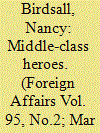

|
|
|
|
|
| Summary/Abstract |
The two economic developments that have garnered the most attention in recent years are the concentration of massive wealth in the richest one percent [1] of the world’s population and the tremendous, growth-driven decline [2] in extreme poverty in the developing world, especially in China. But just as important has been the emergence of large middle classes in developing countries around the planet. This phenomenon—the result of more than two decades of nearly continuous fast-paced global economic growth—has been good not only for economies but also for governance. After all, history suggests that a large and secure middle class is a solid foundation on which to build and sustain an effective, democratic state. Middle classes not only have the wherewithal to finance vital services such as roads and public education through taxes; they also demand regulations, the fair enforcement of contracts, and the rule of law more generally—public goods that create a level social and economic playing field on which all can prosper
|
|
|
|
|
|
|
|
|
|
|
|
|
|
|
|
| 14 |
ID:
144034


|
|
|
|
|
| Summary/Abstract |
After dithering for decades, governments finally seem to be paying serious attention to the problem of global climate change. Late last year, at the Paris climate conference, they adopted a major new agreement [1] to limit global warming, beginning a process to strengthen commitments to reduce greenhouse gas emissions over time. For many observers, the promises of the Paris conference offer too little, too late, because emissions are high and still rising and because there will be major disruptions to the climate [2] even if countries meet their emissions-reduction pledges. Nevertheless, it had been 18 years since the world’s governments left a major climate summit with an agreement in hand, so just getting to yes in Paris has offered climate diplomacy [3] fresh credibility.
|
|
|
|
|
|
|
|
|
|
|
|
|
|
|
|
| 15 |
ID:
144032
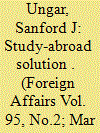

|
|
|
|
|
| Summary/Abstract |
In the Internet age, the world feels far smaller than it used to. But many Americans still know little about the rest of the world and may be more detached from it than ever. Such a lack of awareness is, in certain respects, understandable. Once the Cold War ended, some 25 years ago, Congress, perhaps out of a false sense of security, cut the foreign affairs budget, which led to the closing of some U.S. overseas posts. The news media, especially the commercial television networks, took their cue and began to reduce overseas coverage—responding, they said, to the decline of public interest in such matters, which conveniently coincided with their own economic woes. Although the 9/11 attacks and the subsequent wars in Afghanistan.
|
|
|
|
|
|
|
|
|
|
|
|
|
|
|
|
|
|
|
|
|